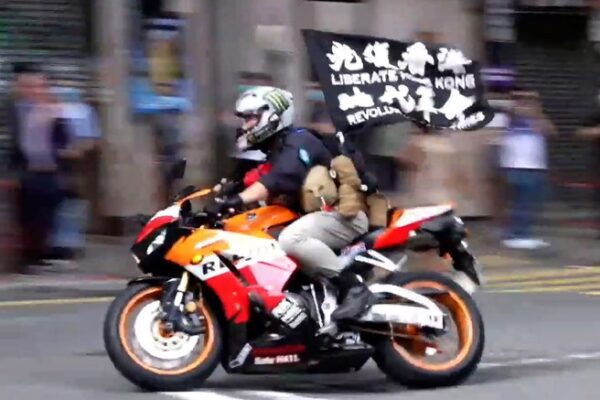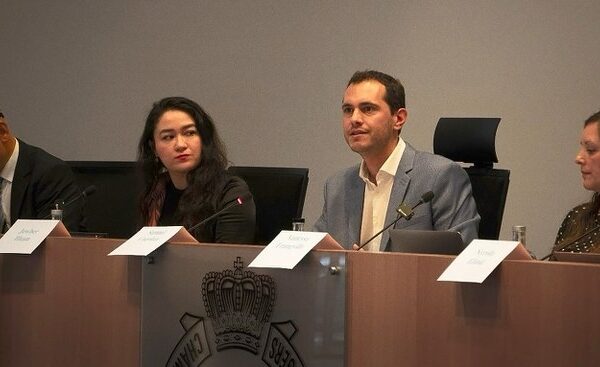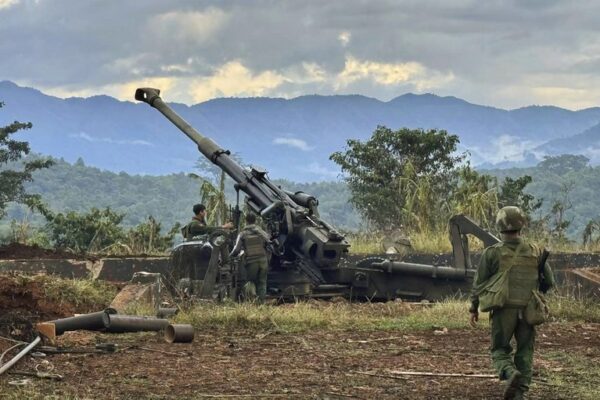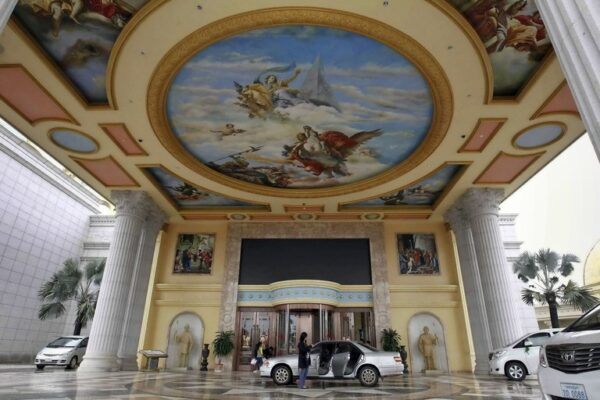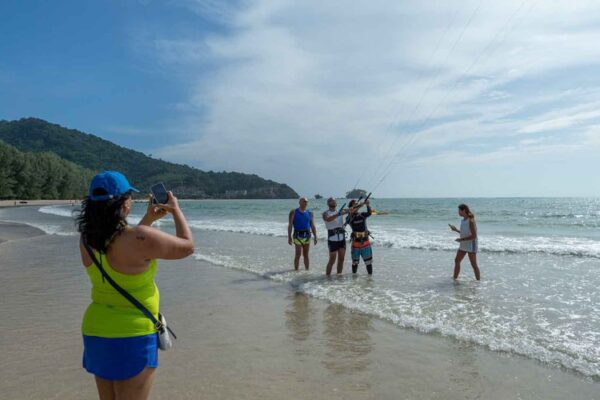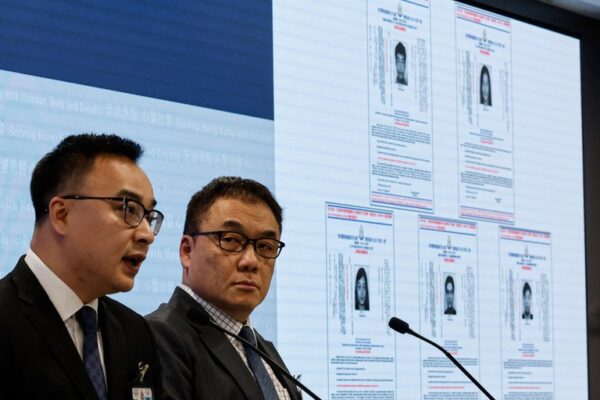
Hong Kong vows to pursue wanted overseas activists ‘to the end’
Hong Kong on Friday vowed to pursue overseas pro-democracy activists on its national security wanted list “to the end,” amid calls from U.S. Congress members for sanctions linked to transnational repression by the Chinese Communist Party. National security police on Thursday issued arrest warrants for former British consular employee Simon Cheng, who co-founded the advocacy group Hongkongers in Britain, Frances Hui of the U.S.-based Committee for Freedom in Hong Kong, U.S. citizen and Hong Kong campaigner Joey Siu and overseas YouTube hosts Johnny Fok and Tony Choi. Police said they had “absconded overseas” and offered a HK$1 million (US$128,000) bounty for information leading to their arrests. “Fugitives should not have any delusion that they could evade legal liabilities by absconding from Hong Kong,” a spokesman said on Friday. “Fugitives will be pursued for life unless they turn themselves in … we will pursue these fugitives … to the end and use all practicable measures to bring them to justice,” he said in a statement posted to the government’s website. The wanted activists “continue to engage in acts and activities endangering national security,” slamming criticism of the move as “unreasonable” and “tainted with double standards,” he said. Chief Superintendent of Police (National Security Department ) Li Kwai-wah and Senior Superintendent Hung Ngan attend a press conference on arrest warrants issued for activists Simon Cheng, Frances Hui, Joey Siu, Johnny Fok and Tony Choi, in Hong Kong, Dec. 14, 2023. (Tyrone Siu/Reuters) The new additions to the Hong Kong authorities’ wanted list come after similar warrants were issued for eight prominent pro-democracy activists in July, and amid growing concern over China’s long-arm law enforcement activities far beyond its own borders. The group are wanted on a slew of charges under a draconian security law that bans public criticism of the authorities, including “incitement to secession”, “incitement to subversion” and “collusion with a foreign country or with external elements to endanger national security,” police said in a statement on Thursday. Intimidation and harassment The warrants prompted calls in Washington for sanctions on Chinese Communist Party-backed officials. “Last night, CCP-controlled authorities in Hong Kong issued bounties on five Hong Kongers living abroad, including two pro-democracy activists living in the United States, one of whom is an American citizen,” Chairman Mike Gallagher and Ranking Member Raja Krishnamoorthi of the House Select Committee on the Strategic Competition Between the United States and the Chinese Communist Party said in a joint statement on Dec. 14. “CCP-controlled Hong Kong authorities’ effort through intimidation and harassment to persecute US citizens and residents engaging in peaceful political activism in the United States is unacceptable,” they said, calling for urgent action from Congress to stem China’s “transnational repression.” U.S. Reps. Mike Gallagher and Raja Krishnamoorthi, seen at a hearing earlier this year, issued a joint statement calling for urgent action from Congress to stem China’s “transnational repression.” (J. Scott Applewhite/AP) Hong Kong’s national security police said on Thursday that “the acts of these five persons seriously endanger national security,” announcing a reward of HK$1 million to members of the public who provide information leading to their arrest. Police also arrested four people on suspicion of offering financial assistance via online crowdfunding to exiled former pro-democracy lawmakers Ted Hui and Nathan Law. No change Wanted activist Frances Hui said she wasn’t surprised by the bounty on her head, and wouldn’t be giving up her advocacy as a result. “I will continue to do what I think is right, including my advocacy activities for freedom and democracy in Hong Kong, and fighting for the imposition of sanctions on Hong Kong officials, continuing to advocate for the release of Hong Kong political prisoners, and continuing to appeal to the international community and [over China’s] transnational human rights violations,” she told Radio Free Asia. “I will also continue to build the overseas Hong Kong community and promote Hong Kong culture.” “I will continue to do what I think is right, including my advocacy activities for freedom and democracy in Hong Kong,” says Frances Hui, seen in the Chinatown neighborhood of Boston, Oct. 2, 2019. (Charles Krupa/AP) Meanwhile, Joey Siu said the Hong Kong authorities are using their trade and economic offices in overseas cities as a base from which to target and harass overseas activists from the city. She said even being a citizen of a foreign country is no protection. “The Hong Kong government’s basis for making me a wanted person is comments I made as a U.S. citizen in my own country,” Siu said. “This just shows how unreasonable and all-pervasive this transnational suppression by the Hong Kong and Chinese governments has become.” An honor Former U.K. consular employee Simon Cheng said it was his “lifelong honor” to be singled out by the authorities. “The accusations … that I betrayed my country are actually highly political and baseless,” Cheng told Radio Free Asia. “It’s actually a pretty humble wish that the government respect the rights of its citizens, and allow their voices to be more freely heard.” “We’re just a bit more persistent than the average person and are not afraid to carry on speaking out, so that’s why we are receiving this so-called punishment,” he said, adding that his main fear is that the authorities will target his friends and relatives in Hong Kong. Simon Cheng, seen in London in 2020, says his main fear is that authorities will target his friends and relatives in Hong Kong. (AP) British Foreign Secretary David Cameron condemned the warrants, saying his government would take up the matter “urgently” with Beijing and Hong Kong officials. “We will not tolerate any attempt by any foreign power to intimidate, harass or harm individuals or communities in the U.K.,” Cameron said in a statement. “This is a threat to our democracy and fundamental human rights.” “We call on Beijing to repeal the National Security Law and end its persecution of political activists.” State Department spokesman Matthew Miller called on Beijing to act in accordance with international norms and…

